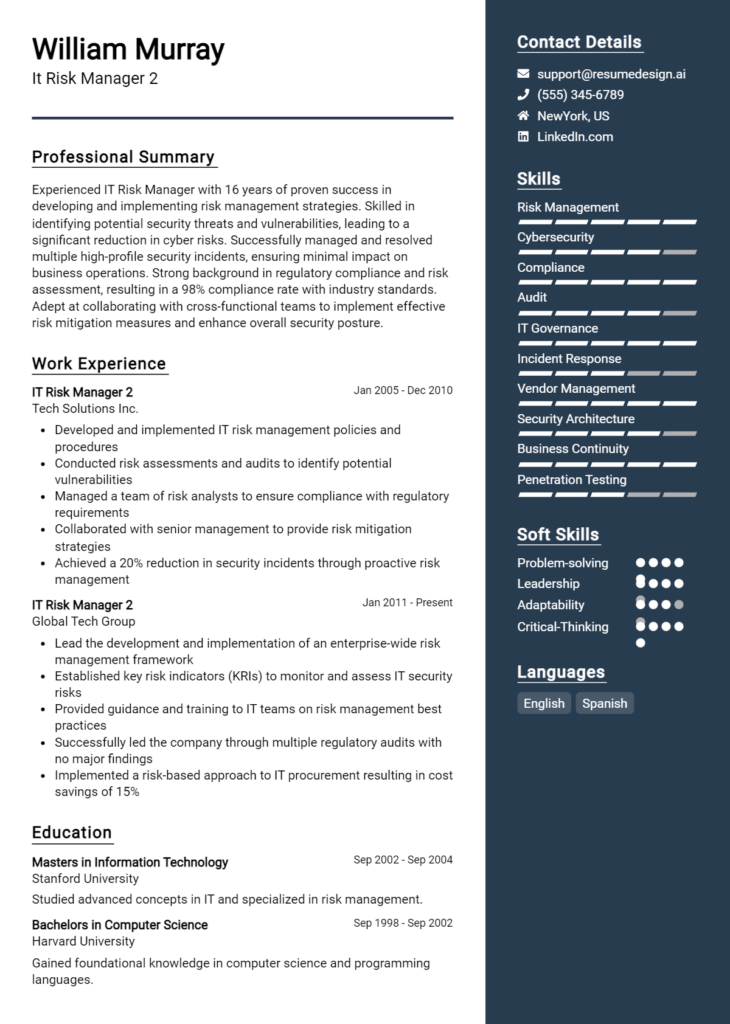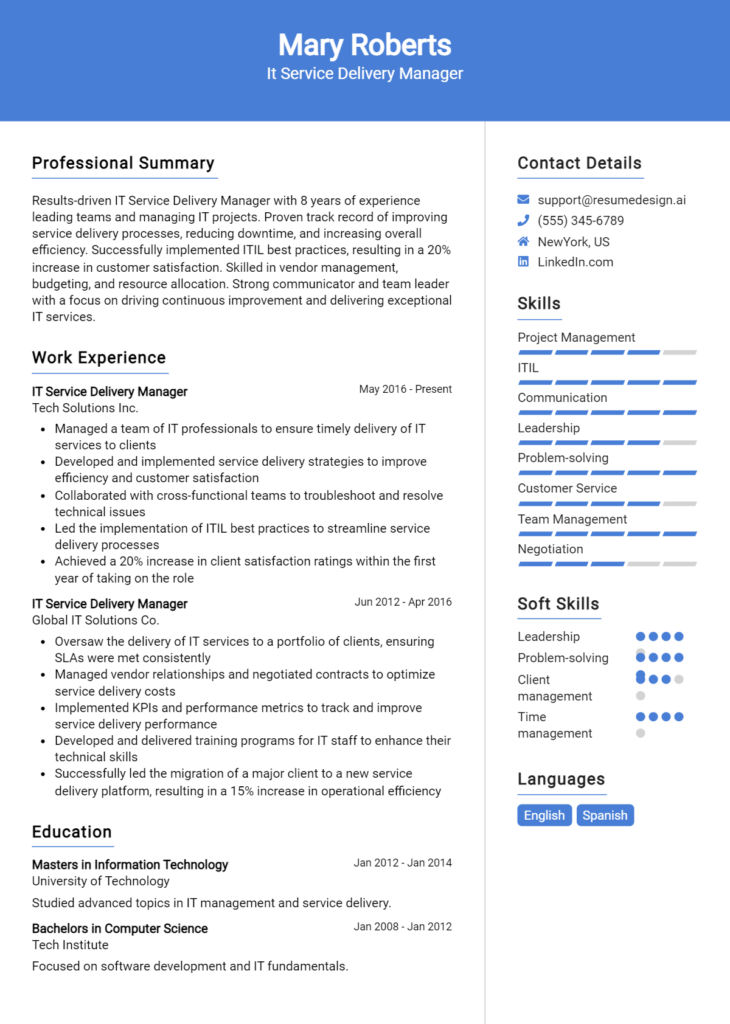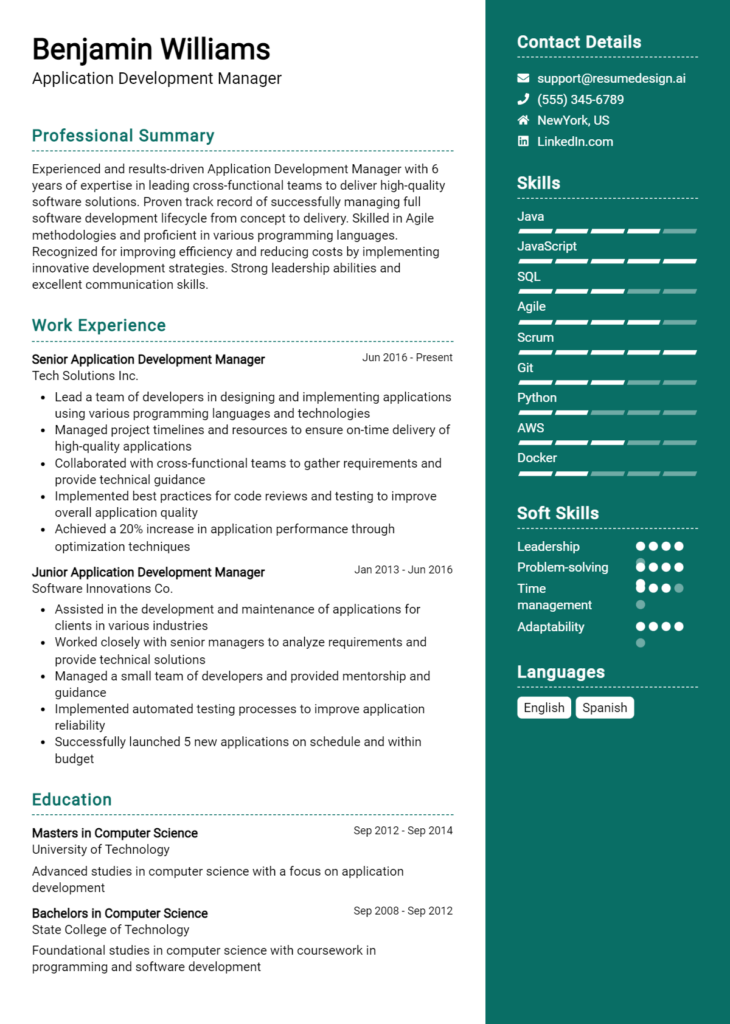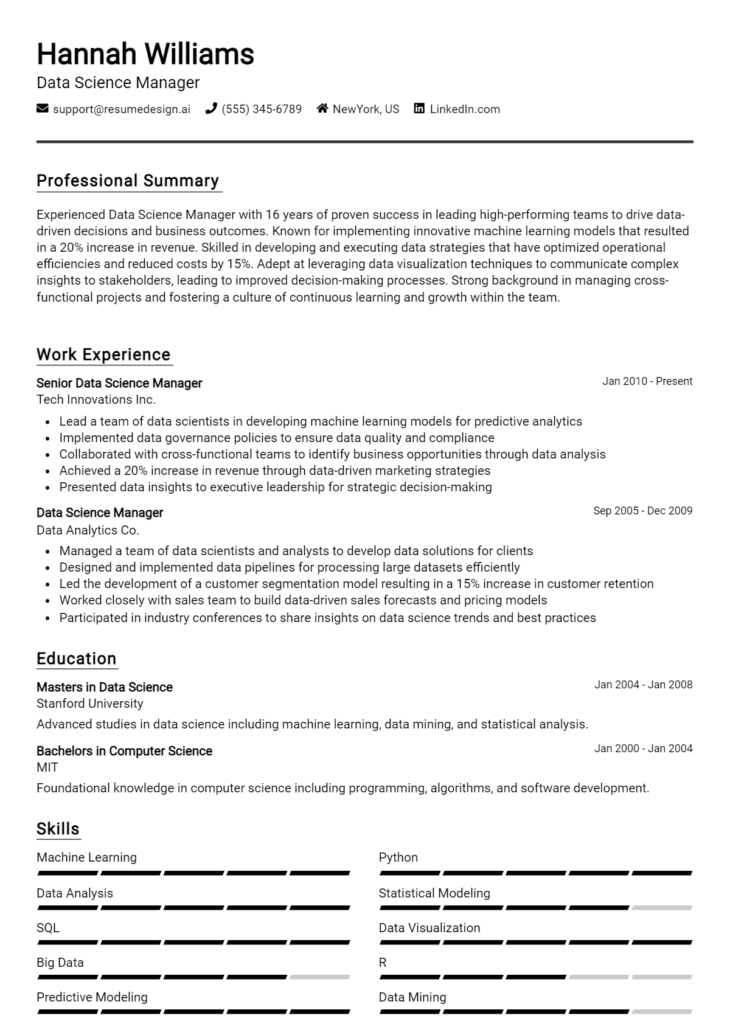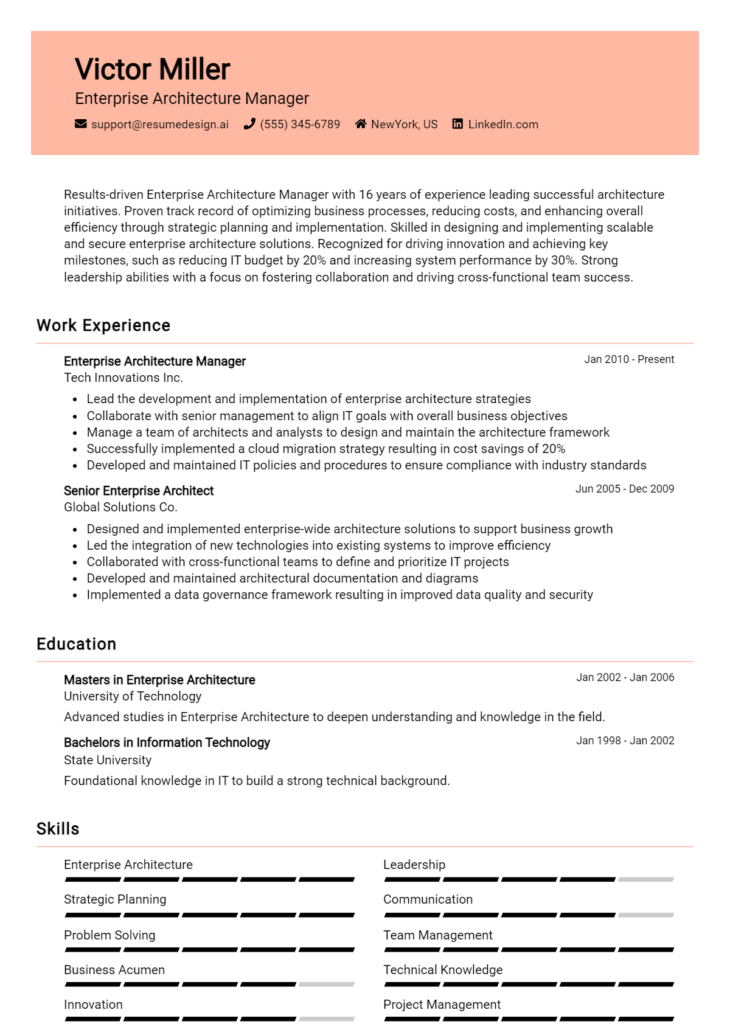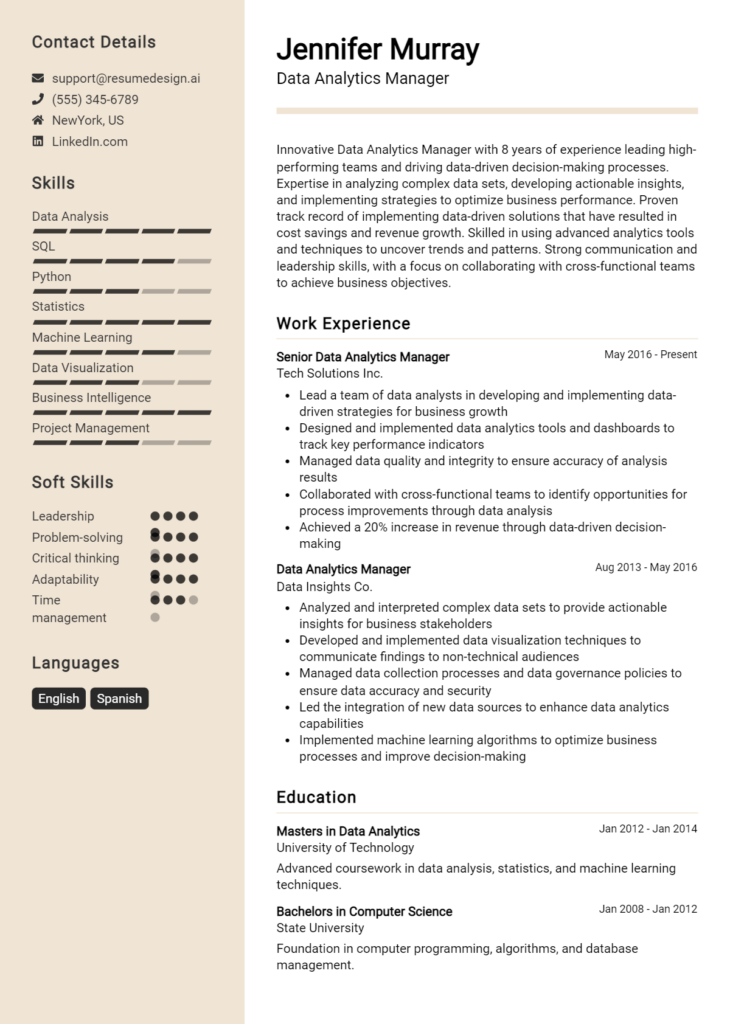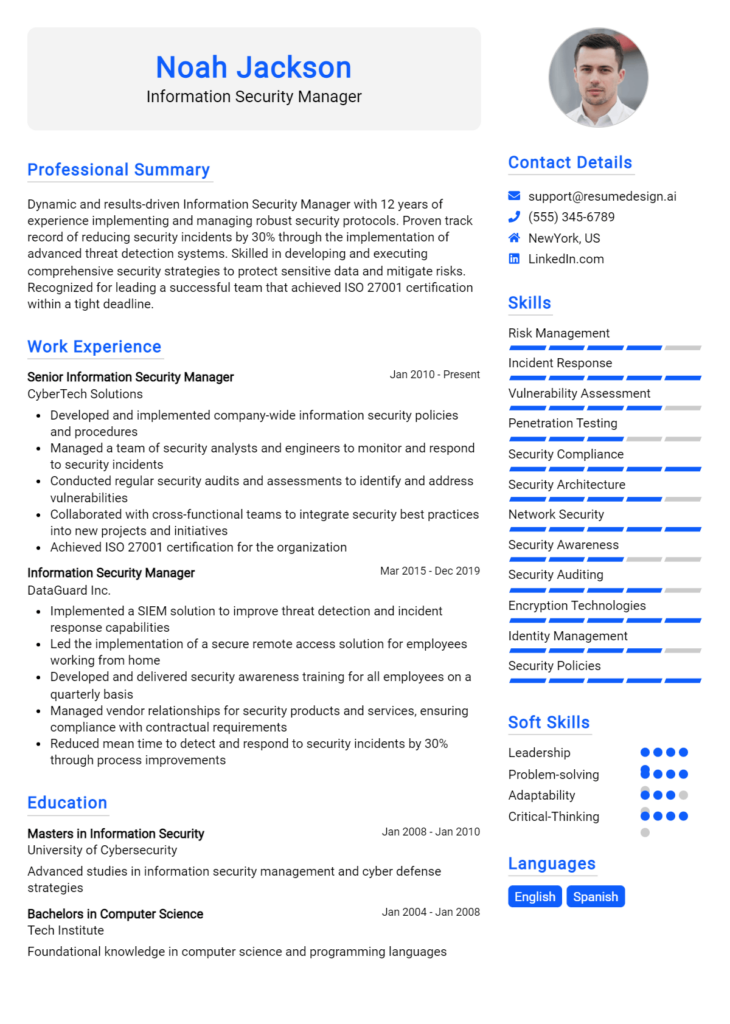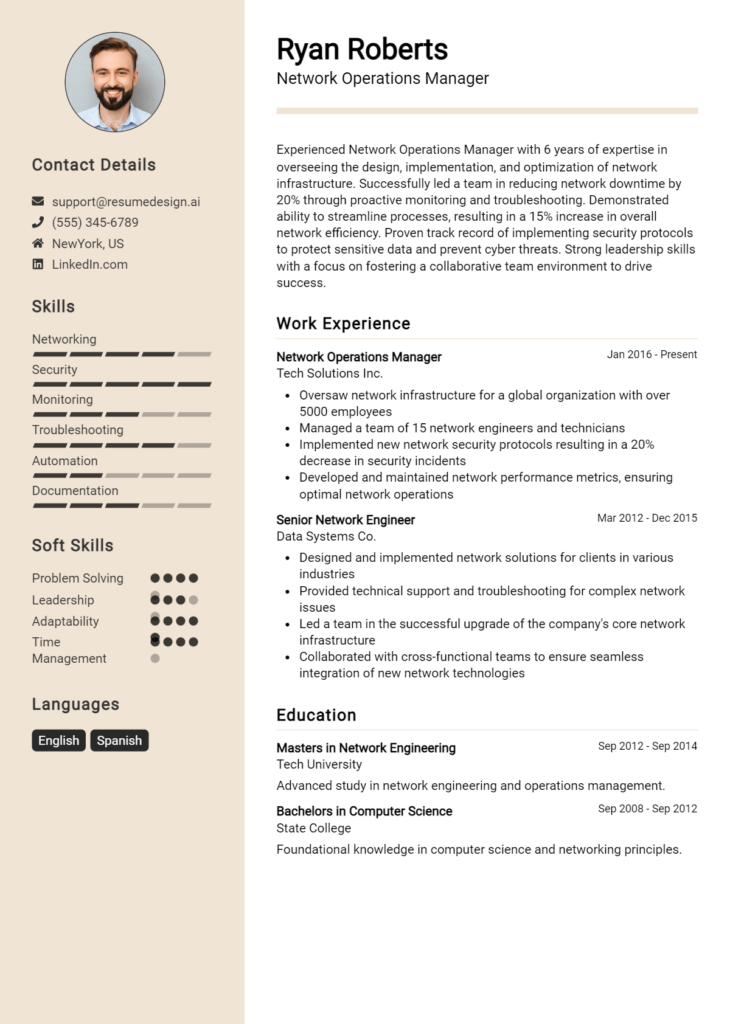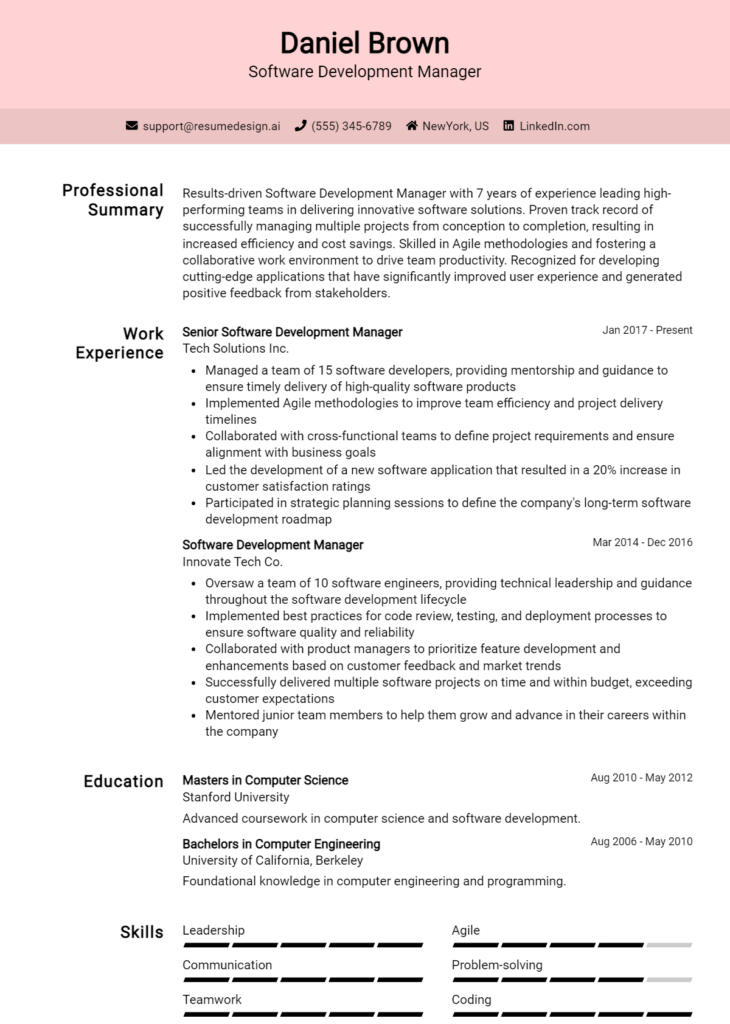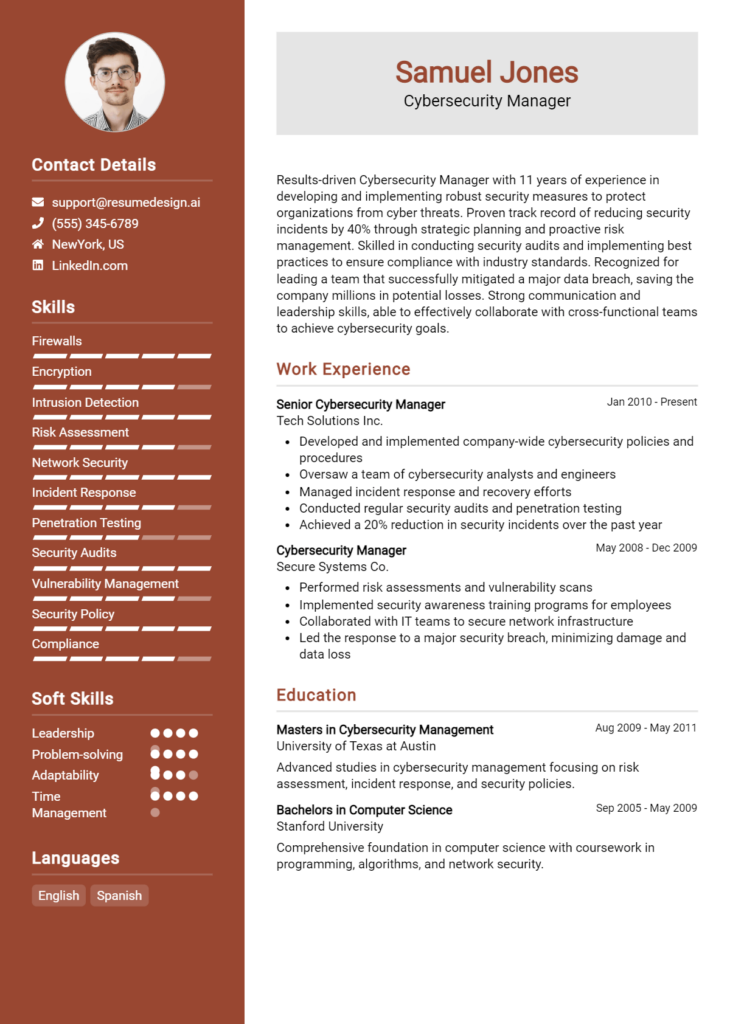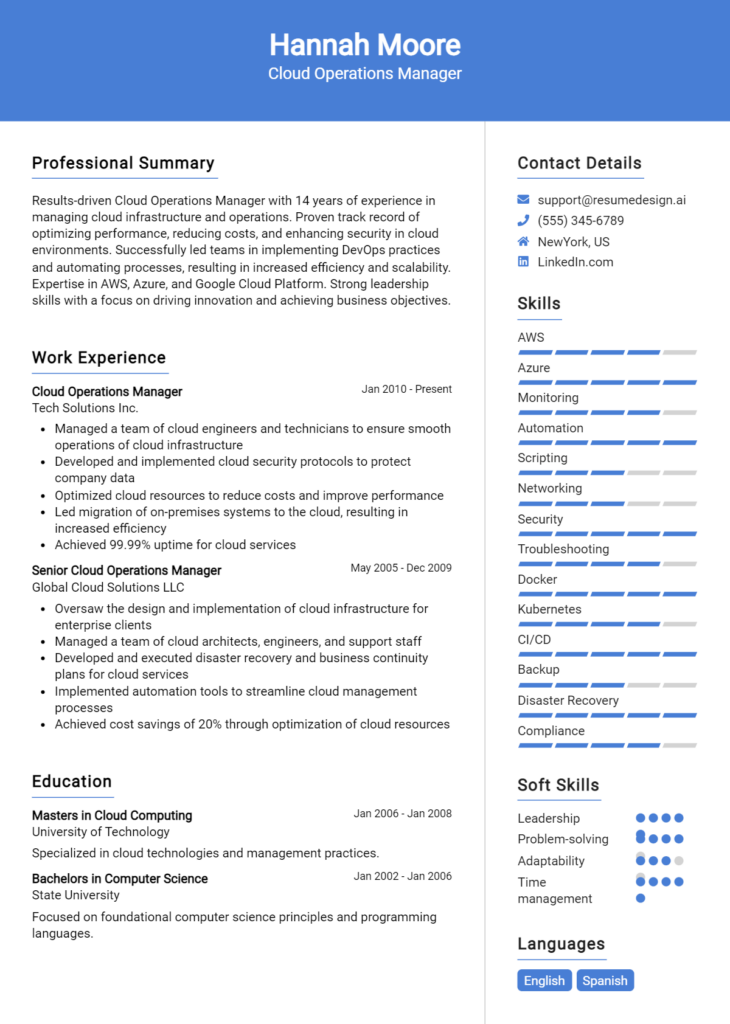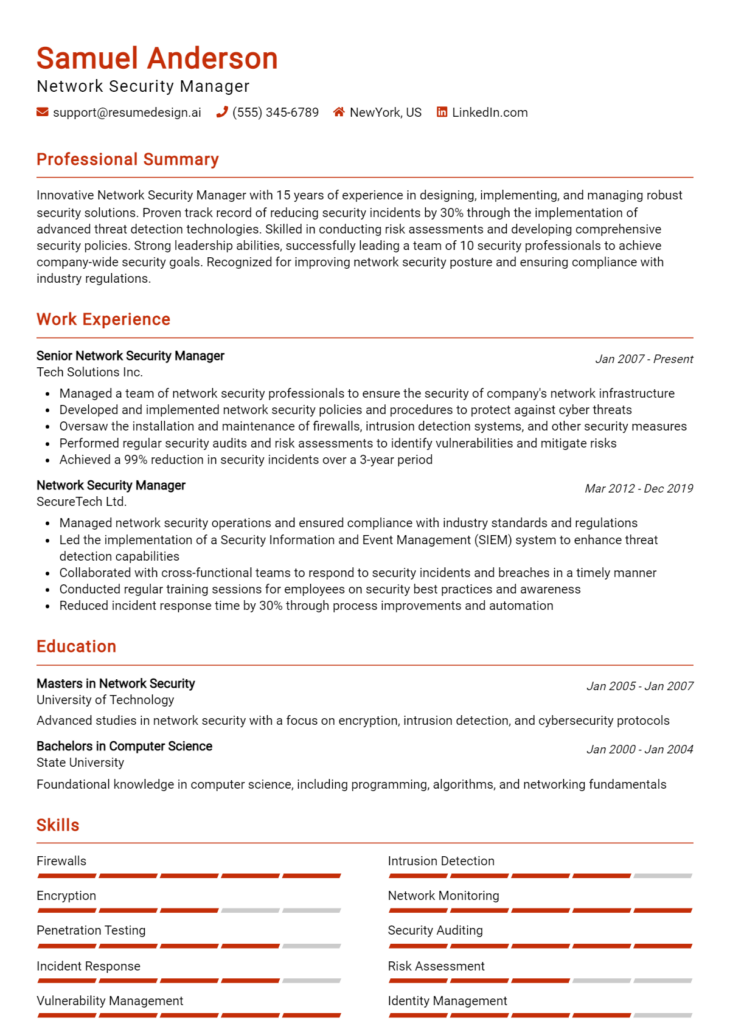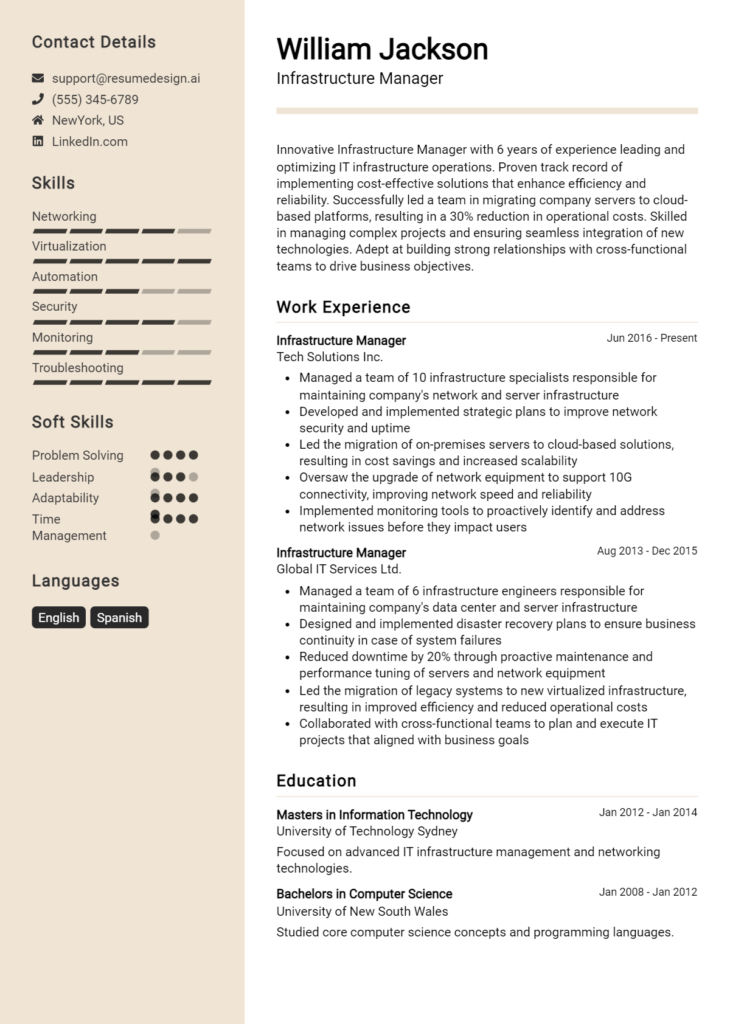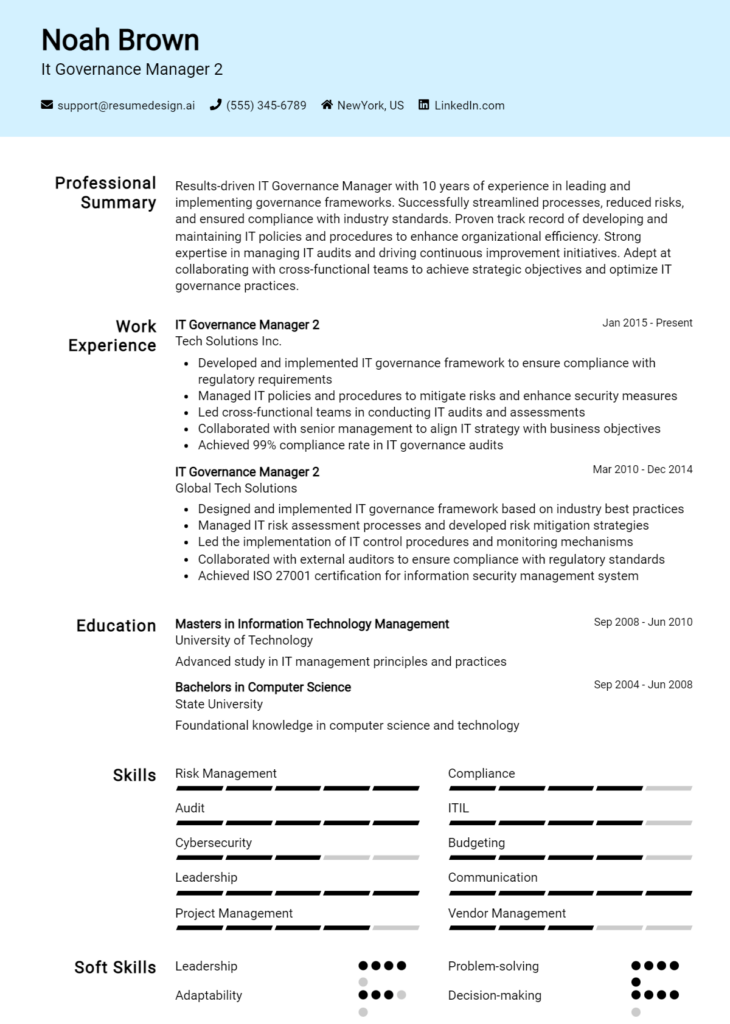DevOps Manager Core Responsibilities
A DevOps Manager plays a crucial role in bridging the gap between development and operations teams, ensuring streamlined processes and collaboration. Key responsibilities include overseeing the implementation of CI/CD pipelines, managing infrastructure, and facilitating effective communication across departments. Necessary skills encompass technical expertise in cloud services, operational knowledge, and strong problem-solving abilities, which are vital for driving organizational goals. A well-structured resume can effectively showcase these qualifications, highlighting the candidate's capability to enhance productivity and innovation.
Common Responsibilities Listed on DevOps Manager Resume
- Designing and implementing DevOps strategies and processes.
- Managing and optimizing CI/CD pipelines.
- Overseeing cloud infrastructure and deployments.
- Collaborating with development, operations, and QA teams.
- Monitoring system performance and troubleshooting issues.
- Implementing automation tools for efficiency.
- Ensuring compliance with security and regulatory requirements.
- Leading incident management and response efforts.
- Training and mentoring team members on DevOps practices.
- Analyzing metrics to drive continuous improvement.
- Managing vendor relationships for tooling and services.
- Creating documentation for processes and systems.
High-Level Resume Tips for DevOps Manager Professionals
In today's competitive job market, a well-crafted resume is essential for DevOps Manager professionals looking to make a lasting impression on potential employers. The resume often serves as the first point of contact, offering a snapshot of a candidate's skills, experiences, and achievements. For a role as dynamic and multifaceted as DevOps Manager, the resume must effectively communicate technical expertise while highlighting leadership capabilities and project successes. This guide will provide practical and actionable resume tips specifically tailored for DevOps Manager professionals, ensuring that your application stands out in the crowd.
Top Resume Tips for DevOps Manager Professionals
- Tailor your resume to the job description, using keywords and phrases that align with the specific requirements of the position.
- Showcase relevant experience by emphasizing past roles and projects that demonstrate your proficiency in DevOps practices and tools.
- Quantify your achievements with metrics, such as reduced deployment times or improved system uptime, to illustrate your impact effectively.
- Highlight industry-specific skills like CI/CD, cloud services, container orchestration, and automation tools that are essential for a DevOps Manager role.
- Include leadership experience, showcasing your ability to manage teams, drive collaboration, and influence cross-functional initiatives.
- Demonstrate your knowledge of best practices in agile methodologies and how you've implemented these in previous roles.
- Prioritize clarity and organization in your resume layout to make it easy for hiring managers to quickly understand your qualifications.
- Incorporate professional certifications related to DevOps and cloud technologies to enhance your credibility and marketability.
- Use action verbs to convey your accomplishments and responsibilities, creating a dynamic and engaging narrative of your career journey.
- Keep your resume concise, ideally one to two pages, focusing on the most relevant and impactful information that aligns with the role you are applying for.
By implementing these tips, you can significantly increase your chances of landing a job in the DevOps Manager field. A tailored and impactful resume not only highlights your technical abilities and leadership experiences but also demonstrates your understanding of the unique demands of the role, setting you apart from other candidates and positioning you as a strong contender in the hiring process.
Why Resume Headlines & Titles are Important for DevOps Manager
In the competitive landscape of DevOps, a well-crafted resume headline or title serves as the first impression a candidate makes on hiring managers. This single line can be pivotal in capturing attention and summarizing key qualifications in a concise manner. A powerful headline encapsulates the essence of a candidate's experience, skills, and value proposition, allowing hiring managers to quickly assess relevancy to the job role. Therefore, creating a headline that is both concise and directly related to the position being applied for is essential for standing out in a crowded job market.
Best Practices for Crafting Resume Headlines for DevOps Manager
- Be concise: Aim for a headline that is brief yet informative, ideally no more than 10-15 words.
- Make it role-specific: Clearly mention 'DevOps Manager' to align with the job title.
- Highlight key skills: Include specific skills such as 'CI/CD', 'Cloud Infrastructure', or 'Agile Methodologies' that are relevant to the role.
- Use impactful language: Choose strong, action-oriented words that convey leadership and expertise.
- Quantify achievements: If possible, include metrics or results that demonstrate your impact in previous roles.
- Tailor to the job description: Align your headline with the language and requirements outlined in the job posting.
- Avoid jargon: Use clear and straightforward language that can be easily understood by all hiring managers.
- Focus on value proposition: Convey what you can bring to the organization rather than just listing titles or roles.
Example Resume Headlines for DevOps Manager
Strong Resume Headlines
Innovative DevOps Manager with 7+ Years of Experience in CI/CD Transformation
Results-Driven DevOps Leader Specializing in Cloud Migration and Automation Strategies
Strategic DevOps Manager with Proven Track Record in Reducing Deployment Times by 40%
Experienced DevOps Manager with Expertise in Agile Practices and Team Leadership
Weak Resume Headlines
DevOps Professional
Manager with Experience
The strong headlines are effective because they immediately convey the candidate's relevant experience, specific skills, and measurable achievements, making them stand out to hiring managers. In contrast, the weak headlines lack specificity and detail, failing to communicate the candidate's unique qualifications or the value they can bring to the organization. This stark difference highlights the importance of crafting a headline that not only captures attention but also provides a clear insight into the candidate's potential impact in the role.
Writing an Exceptional DevOps Manager Resume Summary
A resume summary is a critical component for a DevOps Manager, as it serves as the first impression for hiring managers. This brief section not only encapsulates the candidate's key skills and experiences but also highlights their accomplishments in a way that aligns with the specific needs of the organization. A strong summary is concise yet impactful, designed to quickly capture attention and encourage further reading. By tailoring the summary to the job description, candidates can effectively demonstrate their value and relevance to the role, significantly increasing their chances of landing an interview.
Best Practices for Writing a DevOps Manager Resume Summary
- Quantify Achievements: Use specific numbers and metrics to demonstrate the impact of your work.
- Focus on Skills: Highlight the technical and soft skills that are most relevant to the DevOps role.
- Tailor to the Job Description: Customize your summary to reflect the requirements and keywords found in the job posting.
- Be Concise: Aim for 3-5 sentences that succinctly convey your experience and value.
- Showcase Leadership: Emphasize any experiences where you've led teams or projects successfully.
- Use Action Verbs: Start sentences with powerful action verbs to convey your contributions effectively.
- Highlight Relevant Tools: Mention specific tools and technologies you are proficient in that are relevant to the position.
- Express Passion for DevOps: Convey your enthusiasm for DevOps practices and continuous improvement in your field.
Example DevOps Manager Resume Summaries
Strong Resume Summaries
DevOps Manager with over 8 years of experience in automating deployment processes, leading to a 40% reduction in release times. Proficient in AWS, Docker, and Kubernetes, with a proven track record of managing cross-functional teams to drive efficiency and enhance system performance.
Results-driven DevOps Manager adept at implementing CI/CD pipelines that improved deployment frequency by 50% and reduced failure rates by 30%. Strong background in Agile methodologies and cloud infrastructure management, leveraging tools such as Jenkins and Terraform.
Dynamic DevOps professional with a decade of experience in infrastructure automation and cloud solutions, achieving a 60% improvement in system uptime. Skilled in leading DevOps transformations across various industries, fostering collaboration between development and operations teams.
Weak Resume Summaries
Experienced IT professional with a background in DevOps. I have worked on various projects and can manage teams.
DevOps Manager with knowledge of cloud computing and some experience with automation tools. Looking to apply my skills in a new role.
The strong resume summaries are considered effective because they provide quantifiable results, specific skills relevant to the DevOps role, and a clear demonstration of leadership and expertise. In contrast, the weak summaries lack detail, do not quantify achievements, and appear generic, failing to highlight the candidate's unique qualifications or contributions to potential employers.
Work Experience Section for DevOps Manager Resume
The work experience section is a critical component of a DevOps Manager resume, as it serves as a testament to the candidate's technical skills, leadership capabilities, and commitment to delivering high-quality products. This section not only highlights relevant professional experiences but also illustrates the candidate's ability to manage teams effectively and drive projects to successful completion. By quantifying achievements and aligning experiences with industry standards, candidates can demonstrate their impact and value to potential employers, making this section pivotal in the job application process.
Best Practices for DevOps Manager Work Experience
- Clearly outline your technical skills relevant to DevOps, such as CI/CD, cloud computing, and automation tools.
- Use quantifiable metrics to describe your achievements, such as percentage improvements in deployment speed or cost reductions.
- Highlight leadership experiences, including team management, mentoring, and cross-functional collaboration.
- Align your experiences with industry best practices and standards to showcase your knowledge of the field.
- Incorporate specific technologies and methodologies you've successfully implemented in previous roles.
- Emphasize your problem-solving abilities by detailing challenges faced and solutions implemented.
- Tailor your experiences to the job description to ensure relevance and alignment with the prospective employer's needs.
- Keep descriptions concise and focused, avoiding unnecessary jargon while maintaining technical accuracy.
Example Work Experiences for DevOps Manager
Strong Experiences
- Led a cross-functional team to implement a CI/CD pipeline that reduced deployment times by 40%, significantly enhancing release cycles.
- Managed a cloud migration project that resulted in a 30% cost reduction in infrastructure expenses while improving system reliability.
- Developed and executed a comprehensive training program for staff on DevOps best practices, increasing team productivity by 25%.
- Implemented automated monitoring and alerting systems that decreased incident response times by 50%, leading to improved service uptime.
Weak Experiences
- Worked on various projects related to DevOps without specifying any details or outcomes.
- Participated in team meetings and contributed ideas, but did not provide context on results or impact.
- Assisted in the deployment process, but failed to mention specific technologies or improvements achieved.
- Responsible for managing a team without detailing leadership accomplishments or quantified results.
The examples provided are considered strong because they clearly articulate specific achievements, quantify results, and demonstrate technical leadership and collaboration. In contrast, the weak experiences lack detail, context, and measurable outcomes, making it difficult for potential employers to assess the candidate's true capabilities and contributions. Strong experiences paint a clear picture of the candidate's value, while weak experiences leave too much to interpretation.
Education and Certifications Section for DevOps Manager Resume
The education and certifications section of a DevOps Manager resume is crucial in establishing a candidate's qualifications and expertise in the field. This section not only highlights the applicant's academic background but also showcases industry-relevant certifications and ongoing learning efforts. By detailing relevant coursework, specialized training, and recognized credentials, candidates can significantly enhance their credibility and demonstrate alignment with the job role. A well-structured education and certifications section signals to potential employers that the candidate is committed to professional growth and possesses the necessary skills to lead in a rapidly evolving technological landscape.
Best Practices for DevOps Manager Education and Certifications
- Focus on relevance: Choose degrees and certifications that directly relate to DevOps principles and practices.
- Include specific coursework: Highlight relevant courses that demonstrate expertise in areas such as cloud computing, automation, and continuous integration.
- Prioritize advanced credentials: Showcase advanced degrees (e.g., Master's) or specialized certifications (e.g., AWS Certified DevOps Engineer) that set you apart.
- Emphasize industry-recognized certifications: List certifications from reputable organizations (e.g., Certified Kubernetes Administrator) that are well-respected in the industry.
- Keep it concise: Provide only the most relevant and recent educational experiences to maintain clarity and focus.
- Showcase continuous learning: Include any ongoing education or recent workshops that illustrate a commitment to staying updated with industry trends.
- Be honest and accurate: Ensure all listed qualifications are truthful and reflect your actual capabilities.
- Format consistently: Use a clean, professional format that makes it easy for hiring managers to read and recognize your qualifications.
Example Education and Certifications for DevOps Manager
Strong Examples
- M.S. in Computer Science, XYZ University, 2020
- AWS Certified DevOps Engineer - Professional, 2022
- Certified Kubernetes Administrator (CKA), 2021
- Relevant Coursework: Cloud Infrastructure, Continuous Delivery, and Agile Project Management
Weak Examples
- B.A. in History, ABC University, 2010
- CompTIA A+ Certification, 2010
- Microsoft Office Specialist Certification, 2018
- Relevant Coursework: Introduction to Art History
The examples provided illustrate a clear distinction between strong and weak qualifications. Strong examples are directly aligned with the DevOps role, showcasing relevant advanced degrees, industry-recognized certifications, and pertinent coursework that reflects the candidate's expertise in the field. In contrast, weak examples fail to demonstrate relevance to DevOps, featuring outdated or unrelated qualifications that do not support the candidate's suitability for a managerial position in this domain.
Top Skills & Keywords for DevOps Manager Resume
As a DevOps Manager, showcasing the right skills on your resume is crucial for standing out in a competitive job market. The blend of technical prowess and interpersonal abilities plays a significant role in effectively managing the development and operations teams. A well-crafted resume that highlights both hard and soft skills can demonstrate to potential employers your capability to streamline processes, foster collaboration, and drive innovation. By emphasizing these skills, you not only outline your qualifications but also reflect your understanding of the dynamic nature of the DevOps environment. For more insights, check out our skills resource.
Top Hard & Soft Skills for DevOps Manager
Soft Skills
- Leadership
- Communication
- Collaboration
- Problem-solving
- Adaptability
- Conflict resolution
- Time management
- Critical thinking
- Emotional intelligence
- Mentoring and coaching
Hard Skills
- Continuous Integration/Continuous Deployment (CI/CD)
- Cloud computing (AWS, Azure, GCP)
- Infrastructure as Code (IaC)
- Containerization (Docker, Kubernetes)
- Scripting languages (Python, Bash)
- Monitoring and logging tools (Prometheus, ELK Stack)
- Version control systems (Git)
- Configuration management (Ansible, Puppet, Chef)
- Network security
- Agile methodologies
A comprehensive understanding of these work experience elements will further enhance your resume, making it an effective tool for landing your dream role as a DevOps Manager.
Stand Out with a Winning DevOps Manager Cover Letter
I am excited to apply for the DevOps Manager position at [Company Name], as advertised on [where you found the job listing]. With over [X years] of experience in DevOps practices and a proven track record of leading cross-functional teams, I am eager to leverage my skills in continuous integration and deployment, infrastructure as code, and agile methodologies to drive operational excellence and innovation within your organization. My passion for fostering collaborative environments and streamlining processes aligns perfectly with [Company Name]'s commitment to delivering high-quality software solutions.
In my previous role at [Previous Company], I successfully led a team of engineers in the implementation of a robust CI/CD pipeline that reduced deployment times by [X%], significantly improving our software delivery process. By integrating automated testing and monitoring, we not only increased the reliability of our releases but also enhanced team productivity and morale. My hands-on experience with tools such as Jenkins, Docker, and Kubernetes, combined with my ability to mentor and guide team members, has equipped me with the necessary skills to effectively manage DevOps initiatives and promote a culture of continuous improvement.
I believe that effective communication and collaboration are key to successful DevOps practices. At [Previous Company], I initiated regular cross-departmental meetings that broke down silos and improved alignment between development, operations, and quality assurance teams. This initiative resulted in a [X%] reduction in production incidents and fostered a shared sense of ownership over the software development lifecycle. I am excited about the opportunity to bring this collaborative approach to [Company Name], ensuring that all stakeholders are engaged and informed throughout the development process.
I am particularly drawn to [Company Name] because of [specific reason related to the company or its values], and I am eager to contribute my expertise to support your goals. I look forward to the opportunity to discuss how my background and vision for DevOps can support [Company Name]'s success. Thank you for considering my application; I hope to speak with you soon.
Common Mistakes to Avoid in a DevOps Manager Resume
When crafting a resume for a DevOps Manager position, it’s crucial to present a clear and compelling narrative of your skills and experiences. However, many candidates fall into common pitfalls that can undermine their chances of landing an interview. Understanding these mistakes can help you create a polished resume that effectively showcases your qualifications. Here are some common mistakes to avoid:
Vague Job Descriptions: Simply listing job titles without providing specific responsibilities and achievements can leave hiring managers confused about your actual experience.
Neglecting Soft Skills: While technical expertise is vital, neglecting to highlight leadership, communication, and teamwork skills can make your resume less appealing.
Overloading with Technical Jargon: Using too much technical terminology may alienate non-technical hiring managers. Strive for a balance between technical details and plain language.
Ignoring Metrics and Achievements: Failing to quantify your accomplishments with metrics (e.g., "improved deployment speed by 30%") can make your contributions seem less impactful.
Lack of Tailoring: Sending out a generic resume without tailoring it to the specific job description can result in a missed opportunity. Personalizing your resume shows attention to detail and genuine interest.
Forgetting About Cultural Fit: Not including elements that reflect your ability to fit into the company culture can be a drawback. Employers look for candidates who align with their values and work environment.
Omitting Continuous Learning: In a rapidly evolving field like DevOps, failing to mention ongoing education, certifications, or training can suggest a lack of commitment to professional growth.
Poor Formatting: A cluttered or overly complex layout can make your resume hard to read. Stick to a clean, professional format that enhances readability and highlights your key points effectively.
Conclusion
As we conclude our exploration of the essential skills and responsibilities of a DevOps Manager, it’s important to reflect on how these elements translate into your professional profile. A successful DevOps Manager not only possesses technical expertise in cloud computing, CI/CD pipelines, and infrastructure management but also excels in team leadership, collaboration, and problem-solving. By fostering a culture of continuous improvement and automation, you can drive efficiencies that benefit your organization and enhance your career trajectory.
To ensure that your resume stands out in a competitive job market, take a moment to review and update it with the latest skills and accomplishments that reflect your expertise as a DevOps Manager. Highlight your experience with relevant tools and methodologies, showcasing your ability to lead cross-functional teams and implement robust DevOps practices.
We encourage you to leverage the available resources to enhance your resume. Consider using resume templates to structure your information effectively. A resume builder can streamline the process, allowing you to create a polished document that highlights your strengths. Additionally, exploring resume examples can provide inspiration for formatting and content, while cover letter templates can help you craft a compelling introduction to your candidacy.
Take action today—revise your DevOps Manager resume and make sure it accurately reflects your capabilities and achievements. Your next opportunity awaits!

